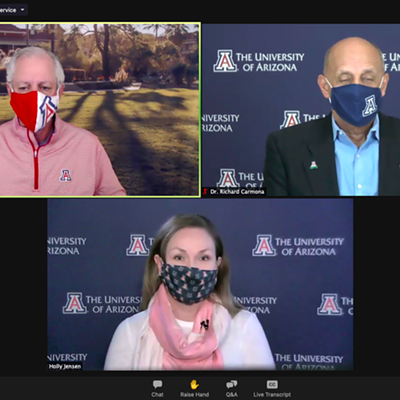Call it déjà vu all over again.
Back in 2006, Donald Rollings and his family sued the city of Tucson for more than $3 million. The Rollings alleged that century-old water mains were leaking throughout the even-older Barrio Viejo neighborhood south of downtown, and destroying historic adobe properties from the ground up.
The city fought those claims—paying a hefty sum for hired attorneys—and triumphed with the jury. However, the Rollings appealed, winning the right to a new trial.
On May 5, they reopened the suit, after years spent trying to hammer out a deal with the city.
It's tough to negotiate when the city won't fess up. Instead, officials have steadfastly blamed the damage to these historic homes on Tucson's rainfall (annually less than 15 inches), and on the Rollings family's restoration techniques, which involved using concrete. Years ago, it was common to repair adobe walls with cement; today, it's known that cement doesn't allow the abode to "breathe," and can instead trap moisture.
What the city still hasn't explained, however, is why all the deterioration in these barrio properties has been limited to walls and floors nearest those shallow old mains. Or why it is also occurring in homes that have not used cement for restoration.
It's also unclear why city officials put such faith in their various explanations, despite pressure-testing of those mains in 2005—by a firm working for the city—that showed many of them to be in decrepit condition.
Nor is this saga just about the Rollings anymore. In fact, many of the Rollings' barrio neighbors are seeing walls crumble and floors buckle in the homes they've spent years restoring.
They include property owners such as Lisa Mele, who's dismayed at the ongoing water damage in her 19th-century adobe. (See "Subterranean Nightmare," Currents, March 10.) The effects mirror those seen in the Rollings properties—widening ruptures in her concrete floor, patches of exterior wall peeling away, and cracks zigzagging up her walls. As with the Rollings buildings, all that destruction is happening only on the side of her home nearest the water main.
"I just think it's really disgusting that the city is holding so hard and fast that there's nothing wrong here," she says.
That disgust mingled with discouragement, she says, when Ward 6 Councilman Steve Kozachik made a fact-finding trip to the barrio early last month. He was accompanied by geotechnical engineers "who said that the rainwater never goes more than 6 inches into the ground, and that the moisture is at the same level as the (water mains). We all agree there is water damage to these buildings, and right there is the source," Mele recalls.
But Councilman Kozachik, whose ward includes Barrio Viejo, says he came away with a far different impression. "Nobody has demonstrated that there are leaky water mains. That's where I'm coming from. That argument failed in court. There is some water-related issue, but there literally used to be subterranean lakes over by the Santa Cruz that may be an issue. It may be sewer; it may be Tucson Water.
"In the best of all worlds—and that's the one I'm trying to operate in—I'd like to set aside the whole issue of litigation, and try to find a solution," says Kozachik. "That's kind of the dance I'm playing right now."
In the meantime, the wheels of justice are groaning back to life. Donald Rollings says he wants the trial to happen sooner rather than later. He's tired of watching his properties crumble, he says, and tired of spending money to do the same repairs over and over. He's very tired of seeing these buildings sit empty because they're unsafe to live in.
At one point, says Rollings, he would have simply settled with the city for the cost of repairs. But now he wants the lost revenue from all those vacant properties. Should he and his family win, Tucson could be on the hook for millions.
"We're taking a measured risk with the lawsuit," he says. "But the city's risk is unknown."
City Attorney Mike Rankin says he spent "months" negotiating with the Rollings family, "and we were not able to come to terms." He wouldn't divulge the sticking points.
Subsequently, the Rollings' legal action came as no surprise, Rankin says. "I knew that they were approaching a deadline for doing so."
He says the city will be represented by the law firm of Mesch, Clark and Rothschild, the same legal team that handled the earlier litigation. One of the firm's partners, Jonathan Rothschild, is running for mayor of Tucson.
According to Silvia Amparano of the city Finance Department, fees for each private attorney will cost taxpayers about $150 per hour. That's in addition to expenditures for various experts and consultants.
"It will cost money," Rankin says, "but just how much depends upon the length of the trial and how many motions are filed. So I can't really give you a reliable figure."
But Mele figures the city could have fixed Barrio Viejo's mains a couple of times over for the money already spent in court. "That's what really gets me," she says.
Instead, Tucson officials seem willing to let the historic barrio crumble before they'll admit any culpability. The reason seems obvious: Acknowledging problems with their century-old mains would open the floodgates to enormous liability claims dating back to at least 1999, when Donald Rollings first filed a claim for the damage. That claim was denied by the city's Risk Management Division.
Instead, says Donald Rollings, the city has rolled the dice by forcing him back into court. "I think it was by design. They didn't intend to do anything about this."
In the end, he says, there was no other way. "It's our last recourse. We have spent the best part of two years meeting with every member of the (City) Council and the mayor. They have not wanted to spend one dime on the repair of these buildings. But they may have to spend a lot.
"If they look at the number for lost rents, you're into hundreds of thousands of dollars. If the jury awards damages, it clearly could exceed the amount we were willing to settle for."












